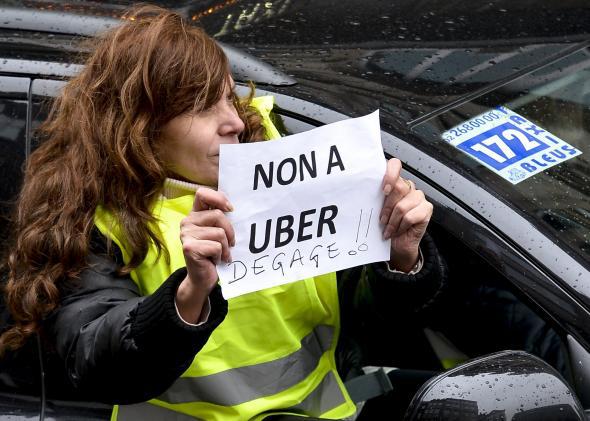Between March 10 and 11, Uber published at least 30 posts on its various city and country blogs trumpeting its “vision for equality”—a plan to create 1 million jobs for women globally on the Uber platform by the year 2020. “We are proud to share with The Uber Community that we are embarking on a new global partnership with UN Women with the goal of accelerating economic opportunity for women,” the company wrote. (Here’s one of those posts that went up in Seattle, but the first three paragraphs were basically the same everywhere.)
Presumably, this was supposed to be an Uber initiative everyone could get behind. More equality, more jobs for women, and the approving stamp of the United Nations. What’s not to like? For a company that’s been dogged by bad press and regulatory challenges, the partnership was probably a welcome public relations coup. So it’s more than a bit awkward that on Friday, U.N. Women abruptly retracted its support for Uber just a week after the partnership began. Specifically, Phumzile Mlambo-Ngcuka, the executive director of U.N. Women, said in a speech that the organization “will not accept an offer to collaborate on job creation with Uber.”
Why the about-face? Well, before we get into that, I’ll note that both Uber and U.N. Women would prefer to pretend there was never any “global partnership” in the first place. “Uber global has provided sponsorship for the UN Women’s event to commemorate the 20th anniversary of the Beijing Platform for Action,” a spokeswoman for U.N. Women wrote in an email. “Beyond this event, we have not discussed opportunities to engage with Uber, including in the context of their commitment to create 1 million jobs for women in the next five years. At this point, we do not plan to expand the collaboration.” And from an Uber spokeswoman: “Uber was proud to sponsor the UN Women event last week, and we share their vision of accelerating economic opportunity for women globally. … Uber will be seeking advice from UN Women and groups around the world on the best way to achieve the important goal of economic equality and opportunity for women.”
Either that onslaught of Uber posts about its new “global partnership” with U.N. Women resulted from a massive miscommunication, or something changed that neither party particularly wants to discuss. (When I replied to both U.N. Women’s and Uber’s statements pointing out this discrepancy, I received no response.) So what really happened?
Well, shortly after Uber made its initial announcement, the International Transport Workers’ Federation, an umbrella association of unions representing more than 4.5 million workers, sent an open letter to U.N. Women denouncing the partnership and the broader “sharing economy.” The part-time, independent-contractor jobs that Uber offers, the group wrote, will increase “informal, piecemeal work” that “contributes significantly to women’s economic dis-empowerment and marginalization across the globe.” More union outcry followed. Soon afterward, U.N. Women reversed course.
The big problem with ITF’s statement is that no one really knows how worried we should be about the “sharing economy” and the proliferation of independent-contractor jobs, so for the moment people are mostly voicing opinions that are convenient for them. In late January, Uber released a study arguing that the jobs it offers are filling a hole in the economy by giving people the chance to set their own schedules and work on their own terms. In that paper, it noted that “women driver-partners,” which make up 14 percent of its workers in the U.S., “were more likely than men to highlight the need for flexibility as a reason for becoming a partner with Uber.” ITF, on the other hand, includes multiple associations of taxi workers, and as pretty much everyone knows, the taxi lobby hates Uber. And what we do know is that Uber and services like it are making things much more difficult for traditional cabbies by increasing competition and cutting into their market share.
It may not be a very helpful conclusion, but it’s probably too soon to say whether Uber is good for women, bad for women, or not really good or bad, just different. The company is still moving ahead with its 1-million-jobs initiative and signing up other collaborators, including iCare Life in India, a group dedicated to training and educating drivers. Maybe U.N. Women will join back up at some point, and maybe it won’t. But it’s no wonder that U.N. Women would prefer that there had never been a partnership to begin with. When relatively little data exists on the economic impact of Uber jobs, caving so quickly to union pressure and strongly worded statements doesn’t exactly look great.
